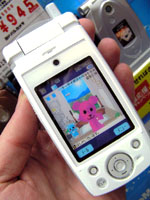QUALCOMM Announces Open Call for BREW 2005 Developer Awards
QUALCOMM Incorporated, pioneer and world leader of Code Division Multiple Access (CDMA) digital wireless technology, today announced the open call for submissions for the BREW® 2005 Developer Awards. BREW publishers and developers are encouraged to submit their top BREW applications by completing an online entry form and providing a demo of their application. The deadline for online nominations is March 11 and submission materials must be received by March 28. Finalists will be announced on the BREW 2005 Awards Web site on May 9, then winners will be revealed at the awards ceremony hosted during the BREW 2005 Conference, June 1-3, in San Diego. For more information, visit: www.brew2005awards.com.


 One of the best things about having a few days off over the holiday season in Tokyo is having time to wander casually through Akihabara and check out the latest gadgets. 2005 is shaping up as a showdown year for music-enabled portable devices and I couldn’t help but notice how DoCoMo’s new 3G handset, the SH901ic by Sharp, really does seem to have at least a slight style similarity to the iPod. As the network speed increases — and with flat-rate packet costs and improved handset technology — critical mass adoption by mainstream users buying even more data seems to be at hand. As competition increases, how will carriers, handset makers and content providers adapt their offerings over the coming year?
One of the best things about having a few days off over the holiday season in Tokyo is having time to wander casually through Akihabara and check out the latest gadgets. 2005 is shaping up as a showdown year for music-enabled portable devices and I couldn’t help but notice how DoCoMo’s new 3G handset, the SH901ic by Sharp, really does seem to have at least a slight style similarity to the iPod. As the network speed increases — and with flat-rate packet costs and improved handset technology — critical mass adoption by mainstream users buying even more data seems to be at hand. As competition increases, how will carriers, handset makers and content providers adapt their offerings over the coming year?